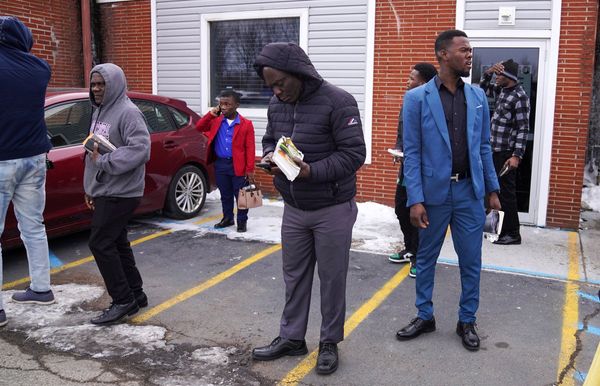Families on legacy benefits say are heartbroken after the High Court ruled the DWP was fair to exclude them from a £20 a week uplift during the pandemic.
Rishi Sunak's Treasury offered all Universal Credit claimants a £20 a week boost after Covid cases soared in 2020 - telling households they would get help to cover bills and housing for 18 months whether they were employed or not.
However, those on Employment Support Allowance (ESA), Income Support and Jobseekers’ Allowance, all known as ‘legacy’ benefits, were told they would not qualify – despite a vast majority of them being registered disabled.
Four of these claimants brought a landmark challenge to the High Court, calling on the support to be backdated for those on legacy benefits”, however today judges ruled against their favour.
That means around 2million sick and disabled people will not get £1,500 in backdated benefits, despite their own hardships during the pandemic.

Most of those left out were on Employment and Support Allowance - which is paid for being sick or disabled, leading to furious claims of a "two-tier" welfare system.
Anja Brown, 55, has been in receipt of ESA for several years. She was forced to give up her job at the Ministry of Defence due to a spinal injury in 2010, and was later left homeless.
Ms Brown, from Chepstow, Wales, says the High Court’s decision feels incredibly unjust.
Should the payments have been available to everyone benefits? Let us know your views in the comments section below
“His grounds was that it was for people who lost their jobs due to Covid, yet every Universal Credit claimant got it. We were all affected by Covid, people who were too vulnerable to leave their homes had extra costs like food deliveries.”
Anja is not able to switch to Universal Credit because she receives the severe disability element.
“How is that fair? I have been contributing to the welfare system, paid my taxes and now get treated like I am the lowest of the lowest, because of my disability?
“Why am I less deserving than someone who just lost their job?”
Mirror reader Tracy Harrison, 54, says she feels abandoned. She has recovered from Leukaemia but now lives with her mother, 74, and is unable to work.
"I am devastated to hear that this has been rejected after months waiting for a decision," she told us.
"My mum and I started cleaning holiday lets before the pandemic. It was extremely hard work and not very good pay.
"Sadly my health took a major knock. I was hospitalised for months and unable to work.
"Since the pandemic everything has risen in price, food, petrol, medication, gas, electric, rent but not benefits.
"Due to my health issues I am cold all the time. We cannot afford to have the heating on, we have to restrict how long we have it on and how high, we are never really warm.
"There was a glimmer of hope thinking we might get this back payment of £1,500.
"To add insult to injury our rent is increasing by £50 per month and now we have been served an eviction notice.
"How do you move house with no money?
"If things continue the way they are there will an abundance of vulnerable people becoming homeless, pensioners and disabled people sleeping rough."
Reader Mrs Robinson was working until the pandemic, but lost her job after schools were forced to close.
"I started a new job in March 2020, after raising my three kids, I was so proud to back in the working world after 16 years of raising kids," she said.
"After the first week the schools got closed, I had no option to accept a zero-hours contract as I didn't have childcare. I was then told by my employer that if I wasn't able to get back to work by August 1 they would terminate my contract, which they did.
"At what point do the courts think it was fair to only give help to Universal Credit claimants? They have no idea what it's like for families on that breadline.
Hugh Ferguson, who receives ESA, agrees. He said: "They say that this was primarily for people that were on furlough or lost their job due to the pandemic.
"Surely if this was the case then they should have given the uplift to this group of people and not made it blanket across the board for all Universal Credit claimants?"
Under the terms of the High Court ruling, Judge Mr Justice Swift ruled the policy was not unlawful discrimination that breached the European Convention on Human Rights.
He admitted legacy benefits were "low", and "it is obvious that any person required to rely only on that level of income will suffer hardship".
But he said the "difference in treatment" between Universal Credit and legacy claimants was "justified", because it was aimed at people who suddenly lost their job due to Covid.
The four claimants' solicitor William Ford, of Osbornes Law, said: "The court’s decision is a devastating blow to more than two million people who we consider were unjustly deprived of the £20 uplift given to those who receive Universal Credit during the pandemic.”
The four claimants were on Employment and Support Allowance (ESA), Income Support and Jobseekers’ Allowance.
Anela Anwar of welfare rights group Z2K said: “The cost-of-living crisis is not going away, and benefit levels remain totally inadequate."
Anastasia Berry of the MS Society, who co-chairs the Disability Benefits Consortium, said it was a "colossal blow" to 2.2million people.
"The government has found a legal technicality to temporarily duck responsibility," she said. "The basic fact remains that it stood idly by while many disabled people were forced deeper into poverty during the pandemic."
She said Tory ministers were now "heaping insult on injury" by raising benefits by 3.1% in April, around half the inflation rate.
But Mr Justice Smith ruled: “The increase to the standard allowance was a way of providing additional support to those who did lose jobs or income because of the pandemic and became reliant on Universal Credit for the first time.
“This group would face particular disruption.
“The increase was intended to cushion the sudden impact of loss of employment or reduced employment.
“I accept this was legitimate objective.”
He added: “New benefits claimants would need to adjust to a loss in income. They would be affected differently to persons already claiming benefits."
A DWP spokesperson said: “We welcome that the Court found in our favour. The temporary £20 uplift for Universal Credit claimants ensured vital support was given to those facing the most financial disruption due to the pandemic.”







